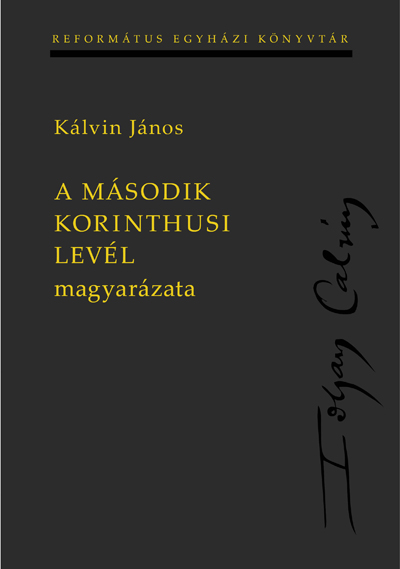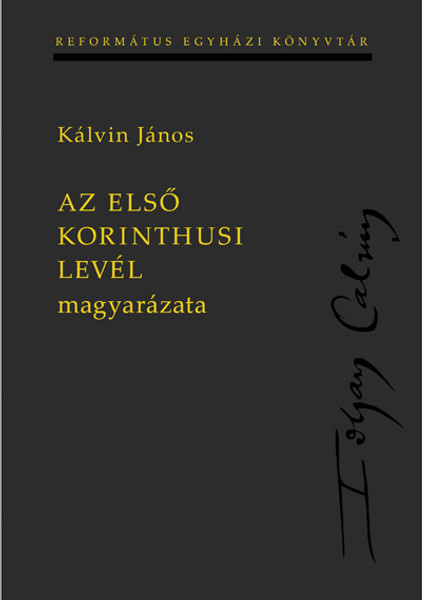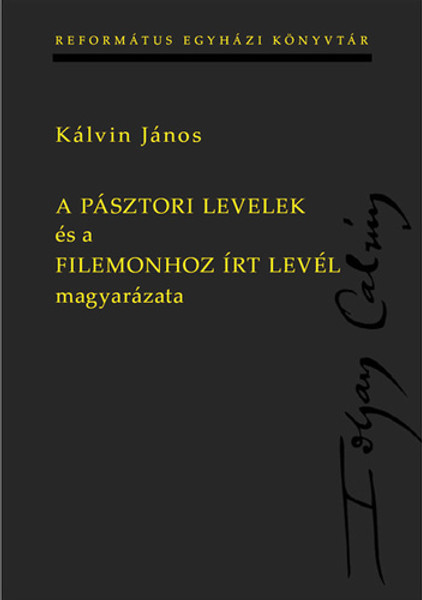Description
A második Korinthusi levél magyarázata By John Calvin
Hungarian Translation of Commentary on 2 Corinthians
Product Details / Termékadatok
- Format / Formátum: Hardcover
- Publication Year / Kiadás éve: 2015
- ISBN: 9789635583072 / 978-9635583072
- ISBN-10: 9635583079
- Pages / Oldalak száma: 208
- Publisher / Kiadó: Kálvin Kiadó
Overview / Áttekintés
English Summary / Angol összefoglaló:
This volume offers the Hungarian translation of John Calvin's insightful commentary on the Second Epistle to the Corinthians. Known for his exegetical depth and theological clarity, Calvin expounds on Paul’s letter with practical and spiritual wisdom. This work highlights the Apostle Paul’s reflections on suffering, ministry, and God’s grace, offering readers a rich resource for understanding this important New Testament book.
Hungarian Summary / Magyar összefoglaló:
Ez a kötet Kálvin János éleslátó kommentárjának magyar fordítása a második Korinthusi levélhez. Kálvin mély exegézise és teológiai világossága révén feltárja Pál apostol gondolatait a szenvedésről, a szolgálatról és Isten kegyelméről. A könyv gazdag forrásként szolgál az Újszövetség e jelentős könyvének megértéséhez.
About the Author / A szerzőről
John Calvin (1509–1564) was one of the most influential figures of the Protestant Reformation. His theology shaped the doctrines of predestination and God’s sovereignty in salvation, establishing the foundation for Reformed theology. Calvin’s works, particularly his Institutes of the Christian Religion and extensive biblical commentaries, continue to be central to Christian theological study.
Kálvin János (1509–1564) a reformáció egyik legjelentősebb alakja volt. Teológiája a predestináció és Isten megváltásban megnyilvánuló szuverenitásának tanait formálta, és lefektette a református teológia alapjait. Munkái, különösen a Keresztyén vallás rendszere és kiterjedt bibliakommentárjai, máig alapvetőek a keresztyén teológiai tanulmányokban.
Key Themes / Főbb Témák
-
Ministry and Weakness / Szolgálat és gyengeség: Paul’s reflections on the challenges of ministry and how God’s power is made perfect in weakness.
Pál gondolatai a szolgálat kihívásairól és arról, hogyan válik Isten ereje teljessé a gyengeségben. -
Reconciliation and Grace / Megbékélés és kegyelem: Insights into the message of reconciliation between God and humanity through Christ.
Rálátás a megbékélés üzenetére Isten és az emberiség között Krisztus által. -
Hope in Suffering / Remény a szenvedésben: Paul’s encouragement to find hope and strength in God amidst trials.
Pál bátorítása arra, hogy a nehézségek közepette is Istenben találjunk reményt és erőt.
Interesting Facts / Érdekes tények
-
This commentary showcases Calvin’s ability to combine theological rigor with practical application for daily Christian living.
Ez a kommentár Kálvin azon képességét mutatja be, hogy teológiai szigorúságot ötvöz a mindennapi keresztyén élet gyakorlati alkalmazásával. -
Calvin wrote this work during the height of the Protestant Reformation, reflecting the intense spiritual and theological challenges of his era.
Kálvin ezt a művet a protestáns reformáció csúcspontján írta, tükrözve kora intenzív lelki és teológiai kihívásait. -
This Hungarian edition provides additional notes and historical context to enrich the modern reader’s understanding.
Ez a magyar kiadás további jegyzetekkel és történelmi kontextussal gazdagítja a mai olvasó megértését.
Product Features / Termékjellemzők
-
Comprehensive Commentary: Verse-by-verse analysis with theological and practical insights.
Átfogó kommentár: Versről versre haladó elemzés teológiai és gyakorlati meglátásokkal. -
Reformed Theology: Grounded in Calvin’s deep commitment to Scripture and Reformed doctrine.
Református teológia: Kálvin mély írástudományi és református tanítások iránti elkötelezettségén alapulva. -
Compact Edition: A focused study of one of Paul’s most personal epistles in just 208 pages.
Kompakt kiadás: Pál egyik legszemélyesebb levelének fókuszált tanulmánya mindössze 208 oldalon.
Publishers / Kiadók
Kálvin Kiadó is committed to producing high-quality theological and biblical literature that upholds the rich heritage of Reformed Christianity.
A Kálvin Kiadó magas színvonalú teológiai és bibliai irodalom kiadásával foglalkozik, amely a református keresztyénség gazdag örökségét képviseli.
We Value Your Feedback! / Fontos számunkra a véleménye!
What insights did you gain from Calvin’s commentary on 2 Corinthians? Share your reflections to encourage others in their study of God’s Word.
Milyen meglátásokat nyert Kálvin kommentárjából a második Korinthusi levélhez? Ossza meg gondolatait, hogy másokat is ösztönözzön Isten Igéjének tanulmányozására!
Hashtags / Hashtagek
#AMásodikKorinthusiLevélMagyarázata #JohnCalvin #KálvinJános #ReformátusTeológia #Bibliakommentár #KálvinKiadó #Reformáció #PaulineEpistles










